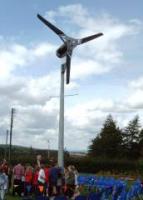14 Feb 2006
One man’s efforts to prepare for the Peak.
 **Kicking Our Fossil Fuel Addiction: one man’s efforts to live sustainably – by John Watson**
**Kicking Our Fossil Fuel Addiction: one man’s efforts to live sustainably – by John Watson**
*This article is one of a series produced by the Totnes Sustainability Group that are published each week on different aspects of sustainability in the Totnes Times. This piece appeared two weeks ago.*
It is said that the most important thing in reducing one’s energy demand is determination. If you lack this perhaps the following facts may help:
• Peak world oil production is considered to be likely to occur between 2000 and 2010, gas a decade or so later.
• Last year world oil production dropped by more than 1%. On recent projections China will need, and be able to pay for, all the world’s exported oil in 10 years time.
When I started trying to reduce my own fossil fuel dependency, I thought I could produce energy by renewable means without changing my practices – the way we are going as a nation. Being in a rural situation I was able to install a small hydro plant, a small wind turbine, photovoltaics and a self-made solar panel for hot water. But all these technologies depend upon oil – the photovoltaic and thermal solar panels and the components of the wind turbine all require oil for their manufacture – so this is the wrong way. Realising this, I began to do what I should have done initially:
• First draught proof and double insulate everything.
• Use good economy light bulbs (some are better than others).
• Make a habit of shutting doors and switching off lights.
• Use curtains and shutters wherever possible
• Cut off cold areas such as patios (I use 1 in. cavity boards slid behind the curtains).
• Close off stairways by the same methods.
I put in a flat-topped wood-burning stove for cooking, linked to the hot water boiler and central heating. It requires two hours a week collecting waste wood and sawing it up with an electric chainsaw. Believing that careful recording is the basis of all improvement, I used to read my meter daily and mark the level of the oil tank (used then for cooking and heating) weekly. But now I use no oil, compared with what would five years ago have cost me £1,000 (at to-day’s prices).
I also have a gadget that records electricity through a 13 amp plug so I can keep an eye on consumption. My freezer uses two and a half units a day in summer, less in winter because it is in a cold shed. A small fridge in the kitchen uses one unit, more than its rated load. It was possible to cut my washing machine’s demand from 2 units to its rated use of half a unit by running a nearby tap until warm, so that the water was not heated electrically.
Living alone is really not efficient energy-wise, however I do my best by trying to generate my four units of electricity a day. Meanwhile if I can produce methane by anaerobic digestion to power my van – my current project – I should have escaped fossil fuel addiction with no loss of quality of life or comfort.
*John is a member of the Totnes Sustainability Group, and is a bit of a local legend. Founder of [Riverford Farm](htp://www.riverford.co.uk”Riverford”) near Totnes, now one of the UK’s biggest organic farming businesses (producing 26,000 vegetable boxes per week), John turned the farm organic when it was almost unheard of. A pioneer in many ways, John has been a great supporter of the Energy Descent planning work here, and has taken to the whole peak oil thing with great passion. I have yet to visit his home, but those who have describe it as a domestic scale CAT. He is currently working on an anerobic digestor in his back garden.*
Steven Woeste
17 Feb 9:28am
If you want to try to get even more energy savings for your washer, try using sunlight to heat the water outside, then bringing the hot water in by hand to pour into the washer. That way you use neither electricity nor gas. I do this by setting out 3, 5-gallon black-plastic bags of water the night before the washing is done, so on a sunny day, the water is hot in time to do the laundry. Assuming sunny weather, it works fine from mid-spring through early autumn.